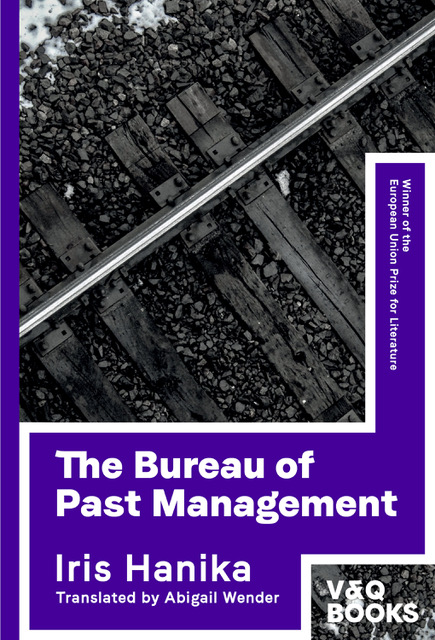
Sometimes books come with translators attached, and that was the case with The Bureau of Past Management. Before we even considered publishing it, Abigail Wender had already been brave enough to take on the daunting task of rendering this linguistically complex book into beautiful and intricate English – with great dedication and success. Here, she reflects on the process, its difficulties and rewards, and how the book’s message might change with its readership.



I met Iris Hanika on a cold February day in New York City in 2016. We took a walk along the East River to Harlem and back down the north end of Central Park, talking without a pause. Not long after, she gave me a copy of her fifth novel, Das Eigentliche. The opening chapter read like a lyric poem, a cry from the heart, and it drew me in immediately. Iris Hanika’s novel is about the psychic cost and legacy of collective guilt explored through the experience of Hans Frambach, a contemporary, middle-aged Berliner undergoing a life crisis.
An archivist, Hans works at the prestigious “Bureau of Past Management,” whose mission is to memorialize the victims of the Holocaust. The German title of The Bureau of Past Management is philosophical in nature. Das Eigentliche could be translated into English as “the quiddity,” “the essence,” “the essential” or, perhaps, “ the real thing,” but that is too colloquial. In German, conceptual adjectives are more easily turned into nouns than in English. As a result, Das Eigentliche, sounds interestingly abstract in German, and perhaps comes across as pretentious in English. For me, the book’s central question was not, “what does it mean to be German?” but, instead, “how do we understand the past, and what is the purpose of collective, historic guilt?” I looked for a title that would lead the reader to consider these issues, and, at the same time, reflect Hanika’s irony and sympathy.
The Bureau of Past Management is the brilliant central fictional device of the novel. I have carried the institution’s title into English with the irony that is implicit in the German, but Hanika’s Vergangenheitsbeschaftigung is also a pun. The actual German word is Vergangenheitsbewältigung, denoting a process, well-known to every German, which means “coming to terms with the disturbing events of the past.” Translating a pun is nearly impossible, and explaining a pun is as deadly as explaining any other joke, but it’s useful to know that the term describes an undertaking that began after the Second World War and continues still (provoking many complicated political arguments and responses). Vergangenheitsbewältigung is a portmanteau, made up of Vergangenheit, meaning the “past” or “history,” and Bewältigung, meaning “coming to terms with.” Hanika substitutes Bewältigung with Bewirtschaftung, and creates a pun, Vergangenheitsbewirtschaftung, which means the “cultivation” or “management” of the past. In reality, of course, there is no government office nor institution like the Bureau of Past Management that “manages” those disturbing events.
One of the surprising ways the novel handles these events is through citations, allusions, cultural references, and quotations, many in their original languages. Hanika’s novel brims with references in every genre: poetry, popular songs, opera, film, politics, philosophy, arcane facts about Berlin, and more. An early delight of mine was simply identifying them—a children’s song? Bertholt Brecht? Celan? Punk Rock? Hölderlin? The protagonist, Hans, is not only an archivist but also a polymath, an obsessive collector of trivia as well as facts. Some of his internal monologues mirror that knowledge reservoir in seemingly endless German sentences. Although it was important to me to keep a semblance of his overflowing sentences, I have changed the structure to reflect English syntax, and used dashes to indicate his breathlessness. His constant documentation, as well as his profession itself, is a somewhat ironic allusion to the Nazis’ well-known penchant for extensive record-keeping. While I did not want to footnote the novel, which I felt would weigh it down (among other issues), I have lightly glossed some references in-text to make their origins more available to an anglophone reader. These citations, allusions, and references add important layers of texture to the novel, and contribute to our sense that the work is an experimental collage of story, history, and culture
The sometimes painful (and sometimes hilarious) reiteration of distress and misery that characterize Hans served as an important anchor for me as a translator. Hanika portrays how history and Hans’ archival work have drained him as he works in the ‘vineyards of memory’. We see him archive the documents of a survivor named Wolkenkraut and the repetitious accounts of imprisonment in concentration camps. Conveying Hans’ despair over National Socialism, the Nazi “crime” as he puts it, alongside his personal misery was a challenge. I was very aware of how careful Hanika was to reveal his personal crisis through subtext and metaphor, and to not compare it to those who suffered as victims of the Holocaust. I tried to translate Hans’ misery through word choice and sentence structure. In an early chapter, for example, Hans sees that ‘Wolkenkraut had never dated these reports, so it was impossible to establish whether he would have broken the lines more sharply over time or found his way to a continuous text’. Hans, by analogy, is also lost, possibly even broken; ‘found his way’ seems to me to reflect Hans’ intense need for a coherent narrative—a sense of self.
Although Hanika’s novel is set in contemporary Germany, it addresses issues of memory and collective guilt that remain relevant in much of the world as we continue to grapple with the legacy of systemic racism, colonialism, intolerance, and injustice. For change to occur, history cannot simply reside in monuments and archives. As James Baldwin wrote in his 1962 essay, A Letter to My Nephew: “This is the crime of which I accuse my country and my countrymen and for which neither I nor time nor history will ever forgive them, that they have destroyed and are destroying hundreds of thousands of lives and do not know it and do not want to know it.” The effort to remember and memorialize should not lead to comfortable passivity; it must inspire meaningful change.
I want to thank the editors at Asymptote and Epiphany Literary Review for publishing excerpts of this translation. I am very grateful to the Bread Loaf Translators Conference community, and to the Deutsche Akademie Rom Villa Massimo for inviting me to stay there to work together with Ms. Hanika. Huge thanks to the many generous writers and translators and native German speakers who offered advice as I worked on this translation. Last, but not least, to Iris Hanika, my deepest thanks for her trust.